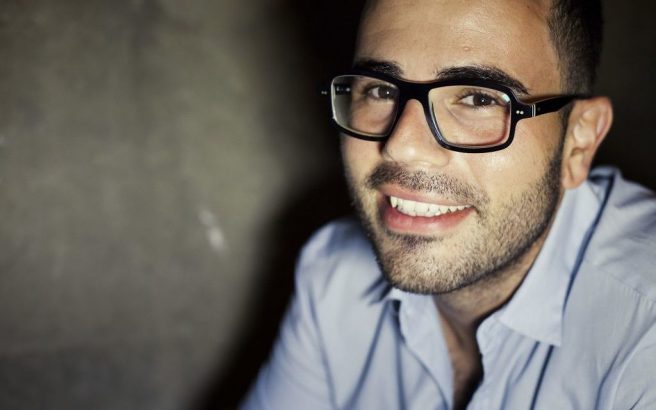Hen Mazzig is an Israeli writer living in London. He is a Senior Fellow at The Tel Aviv Institute (TLVi.org) and a social media influencer. Here are his 10 favourite Israeli music tracks.
Eden Ben Zaken was the runner-up on the second season of X-Factor Israel, yet she quickly became the most played Israeli singer on the radio as well as at almost every Israeli weddings. She achieved a Double Platinum for this album in 2015 and, in the same year, was crowned Israel’s Singer of the Year, a title which she kept for four consecutive years after. Being half Moroccan Jew and half Polish Jew makes her relatable to many Israelis. While her musical style is more Mizrahi (Middle Eastern) her songs blast the speakers of every celebration in Israel. This song, ‘Malkat Hashoshanim’, tells her story of her being ‘the queen of the hood,’ referencing growing up in the northern peripheral town of Keryait Shmone. She expresses how she breaks gentlemen’s hearts and even uses some gay Israeli Hebrew slang (as the song was produced in partnership with LGBTQ Israeli business.) I love this song, and Eden Ben Zaken is probably one of my favorite Israeli Artists for the pluralism she represents.
This one hits home. This song by the incredible three Yemenite sisters who form the band A-Wa, goes to the heart of the story of Mizrahi Jew in Israel. They express the rejection I, too, have experienced for being different from our Ashkenazi brothers and sisters. This song captures how the country they escaped to treated them as foreigners while saving their lives. A-Wa voices my own family’s experience and does it in a gorgeously unique style.
This song by one of the most iconic queens of Mizrahi music, Maraglit Tz’nani, is about how buying her presents doesn’t mean you win her heart. It’s a fun rejection of commercialism and superficiality in romance, and the perfect thing to play when you’re turning down a potential partner of means. Many pop singers in the West repeated this dynamic, but ‘Margol’ was first – and in my humble opinion, the absolute best at capturing this experience.
When my fiancé Marc came from London to Israel for the first time with me, this song was blasting as we were marching down the beach, as part of Tel Aviv’s pride march. He later told me that he felt like it was a part of a movie; everywhere around him, there were Middle Eastern people with rainbow flags dancing around and welcoming him to Tel Aviv with this song. For this gay non-Jewish English man is going to the Middle East for the first time; experiencing this was a surreal moment. Bonus points to Omer Adam for being one of the most prominent Mizrahi music artists in Israel and collaborating with an LGBTQ company to create this song for Pride. It meant a lot to many Israeli Mizrahi LGBTQ folks.
5. Chetzi Meshugat /Nasrin Kadri
New York Times’s Matti Friedman published a feature about Nasrin Kadri in February 2020 that encapsulates how extraordinary she is in Israeli culture. It’s entitled: Israel’s Rihanna Is Arab and Jewish. He wrote: ‘In the past decade or two, Israel’s old elite, which was rooted in Eastern Europe, has aged out of relevance, and the country’s repressed Middle Eastern soul has surged into the vacuum.’ Kadri is one of the top artists in the country, and her music is a fabulous fusion of Jewish and Muslim Middle Eastern influences, which powerfully recognises the diversity of our nation. This song is no exception, with a beat that can get anyone (I mean everyone) dancing.
In 1998, Israel won the Eurovision song contest, an international title that millions desire. How? With a female Trans Mizrahi singer. Dana International, who started her career at 18 as a drag queen, parodying many famous female singers, became a star in her own right. With her glamor, vocals, and stage presence, this artist, who wowed Europe, did it with this phenomenal song. Besides bringing this incredible achievement to Israel, Dana International scored a massive win for the Israeli LGBTQ community as we gained visibility and the love of all Israelis.
7. Comme Ci Comme Ca / Stephan Legar
Stephan Legar is a sensation in Israel with striking looks and a romantic French accent that made him the celebrity crush of many young Israelis. This song speaks to the identity of Israel. To me, the most compelling line is ‘Israël est magnifique mais un peu problématique’ / ‘Israel is wonderful, but a bit problematic’. There is so much pressure for Israel to be a perfect utopia, instead of a real country filled with real, flawed citizen. Stephan removes that weight, and sings about how everything in Israel is ‘so so’ – and wonderful in its imperfections.
Sarit Hadad is another iconic Mizrahi singer, who recently came out of the closet as a lesbian. In 1997, lacking real success in Israel’s mainstream, Hadad moved to the Hashemite Kingdom of Jordan and under the name ‘ سيريت حداد المطربة الكرمل ‘ ‘Sarit Hadad The Singer from The Carmel’ she recorded an album that gained massive popularity in Jordan and throughout the Arab world. She later on returned to Israel and became a star in Israel too. Her work crosses cultures and boundaries. This song is about how she’s going to make a ‘circus’ out of the life of the person who wants her, thinking they will just win her over easily. I remember when the song came out and the excitement of seeing another Mizrahi signer using gay Israeli slang words in her songs, it made it all that more special to me.
Noa Kirel is a young pop sensation in Israel (and now internationally too!) In this song, she’s singing about how hot Israel is – from its climate to the relationships and fashion she enjoys. For me, the pop melody is bolstered by a Middle Eastern tone that makes this the most addictive song. I can’t tell you how often it was heavily rotated on my Spotify.
10. Habib Albi – Static and Ben El ft Nasrin Kadri
This Hebrew-Arabic-English song featuring the aforementioned Nasrin Kadri with the pop duo Static and Ben El Tavori was the feature song for Pride month 2020. It is a tune that celebrates the diverse make-up of the LGBTQ community in Israel. With its catchy hook, it’s no surprise it ended up topping the chart the year it was released. As you must know by now, I have a soft spot for Hebrew-Arabic songs that celebrate the LGBTQ community.





































